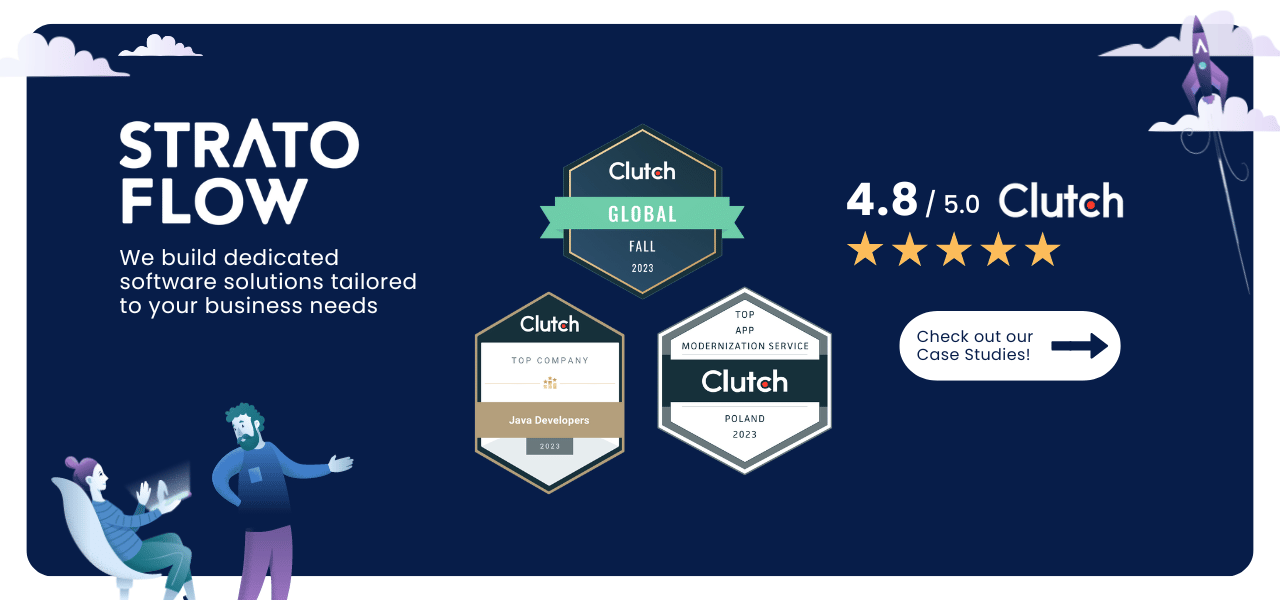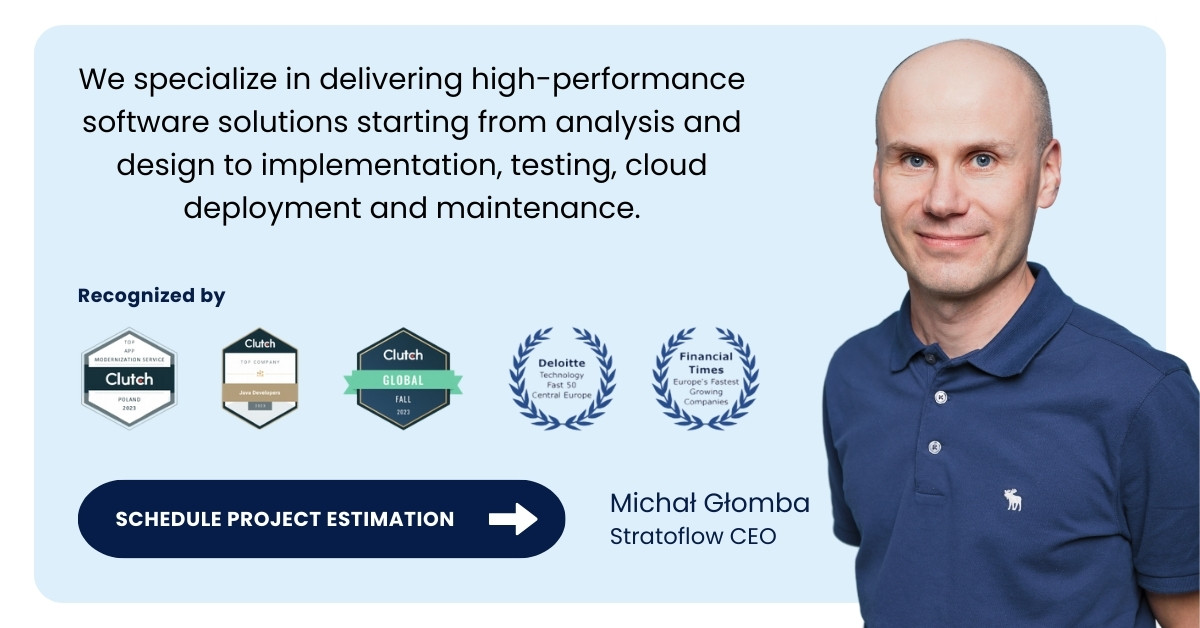
Complete Guide to IT Outsourcing
In today’s economy, cost efficiency has become a necessity for survival and growth.
In this context, IT outsourcing is emerging as a key strategy for companies looking to reduce costs while increasing productivity and innovation.
By tapping into global talent pools, companies can access world-class expertise and cutting-edge technology at a fraction of the cost of maintaining an in-house team.
Featuring industry leaders such as Stratoflow, this guide provides the insights and tools needed to effectively leverage external expertise to ensure your business remains agile and competitive in the digital age.
Contents
- What is IT Outsourcing and Why It Matters?
- What IT Services are Mostly Outsourced?
- How to Find The Best It Service Provider?
- Stratoflow – Your Go-To IT Outsourcing Company
- Financing Models of IT Outsourcing Projects
- What are the Average Costs of IT Outsourcing?
- Lowering the Costs of IT Outsourcing
- IT Outsourcing Statistics
What is IT Outsourcing and Why It Matters?
IT outsourcing is a strategic practice used by companies to delegate their IT functions to external service providers.
This approach allows companies to focus on core business activities while benefiting from the expertise and advanced technologies offered by specialized IT companies.
IT outsourcing covers a range of services, including software development, data storage, network management, and technical support.
Choosing this model can significantly reduce operational costs, improve service quality, and provide access to innovative technologies that might otherwise be inaccessible.
The importance of IT outsourcing and hiring dedicated developers lies in their ability to provide flexible solutions that adapt to the dynamic technology landscape, ensuring that companies remain competitive and efficient.
As businesses increasingly rely on technology to run their day-to-day operations, the strategic use of IT outsourcing becomes critical to maintaining stability and driving growth in the digital age.
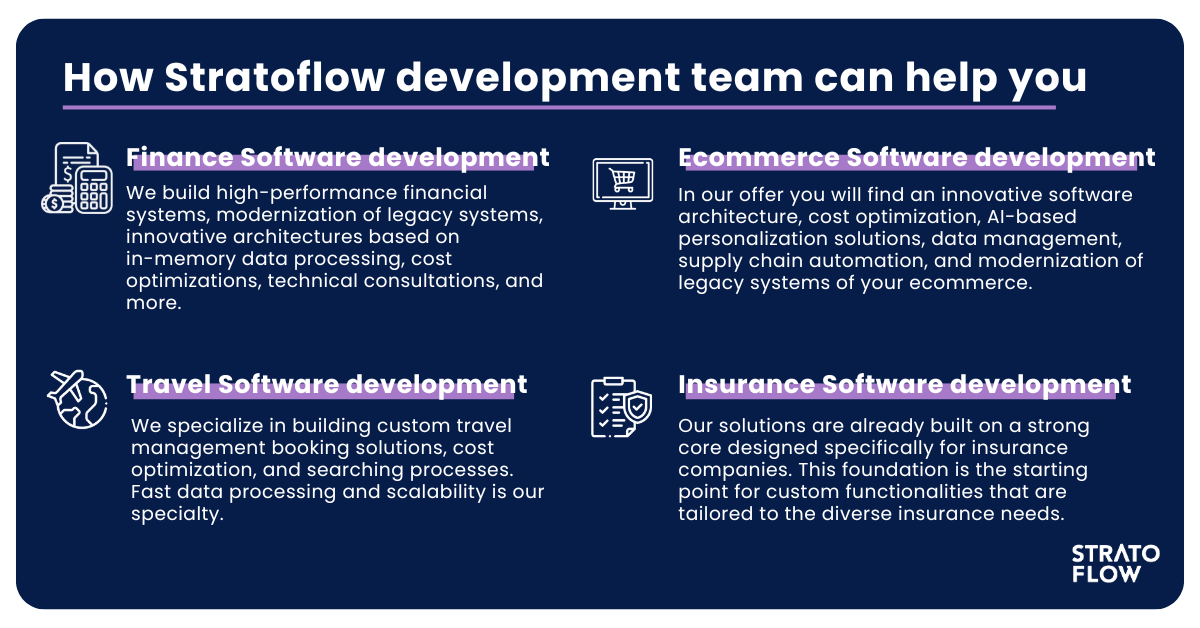
What IT Services are Mostly Outsourced?
When it comes to IT outsourcing, companies often outsource specific services to external providers to take advantage of specialized expertise and cost efficiencies.
This strategic shift not only reduces the burden of managing non-core functions, but also increases operational agility.
Here are some of the most commonly outsourced IT services:
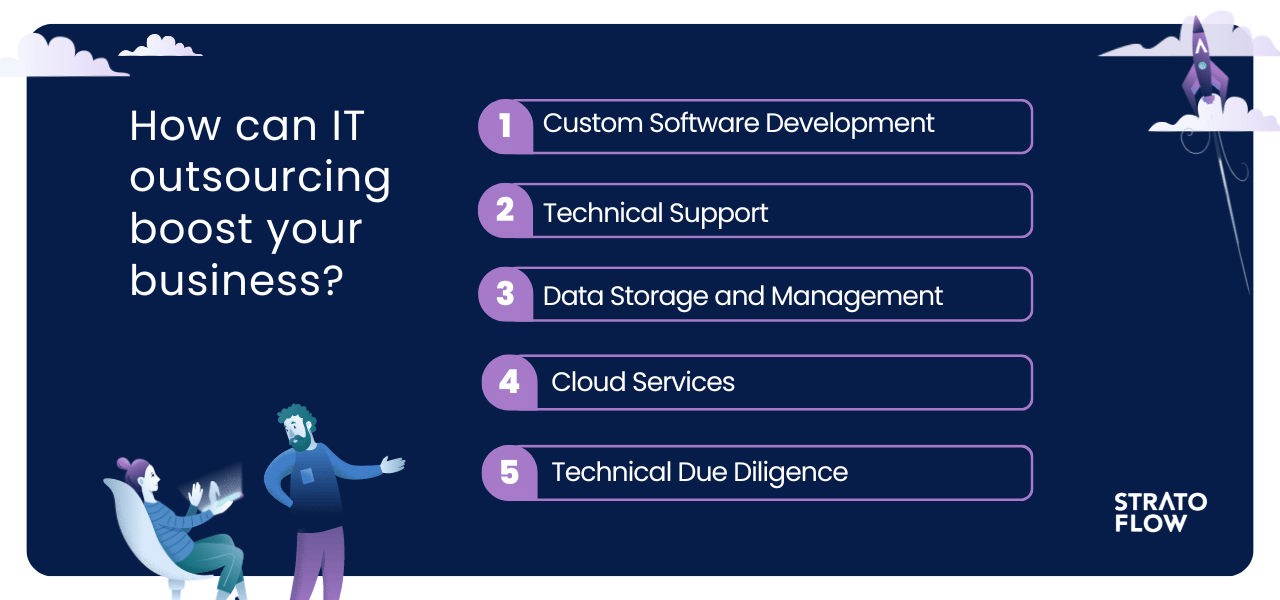
- Custom Software Development: Businesses often outsource this service to access skilled remote developers who can create bespoke software tailored to meet unique organizational needs. This includes everything from mobile app development to comprehensive enterprise resource planning (ERP) systems.
- Technical Support: Outsourcing technical support allows companies to offer 24/7 assistance to their customers without the overhead of an in-house team. This service covers help desk solutions, troubleshooting, and maintenance of hardware and software.
- Data Storage and Management: External providers offer scalable solutions for data storage, backup, and recovery, as well as infrastructure management. This ensures data integrity and accessibility while mitigating the risk of data loss due to unforeseen disasters.
- Cloud Services: From cloud storage solutions to cloud-based software applications, outsourcing cloud services enables businesses to leverage the power of cloud computing without the need for extensive in-house infrastructure.
- Technical Due Diligence: This critical process involves a thorough assessment of the technical aspects of a company, typically conducted before mergers, acquisitions, or investments. Outsourcing technical due diligence can provide an unbiased evaluation of the technology stack, software architecture, code quality, and security protocols, helping investors and companies make informed decisions.
[Read also: Outsourcing Software Development for Startups: Complete Guide]
How to Find The Best It Service Provider?
The popularity and value of IT outsourcing services are clear, but how do you find the right partner who understands your needs and can help you grow your business?
With over 17,138 business services companies listed on Clutch.co, including a vast array of IT outsourcing partners, the platform serves as an invaluable resource for businesses seeking specialized technology expertise.
But with thousands of options available, making an informed decision can be a daunting task.
To effectively navigate through potential partners on Clutch, start by exploring their detailed client testimonials and reviews, which are essential to assessing the quality and reliability of their services.
Pay attention to the details of their past projects to gauge their technical capabilities and industry expertise.
Client testimonials and reviews are critical to the IT service provider selection process, especially when outsourcing critical functions and hiring full stack developers.
These first-hand accounts provide prospective clients with insight into the experiences of previous customers and demonstrate the provider’s ability to meet expectations in terms of project delivery, quality of service, and communication.
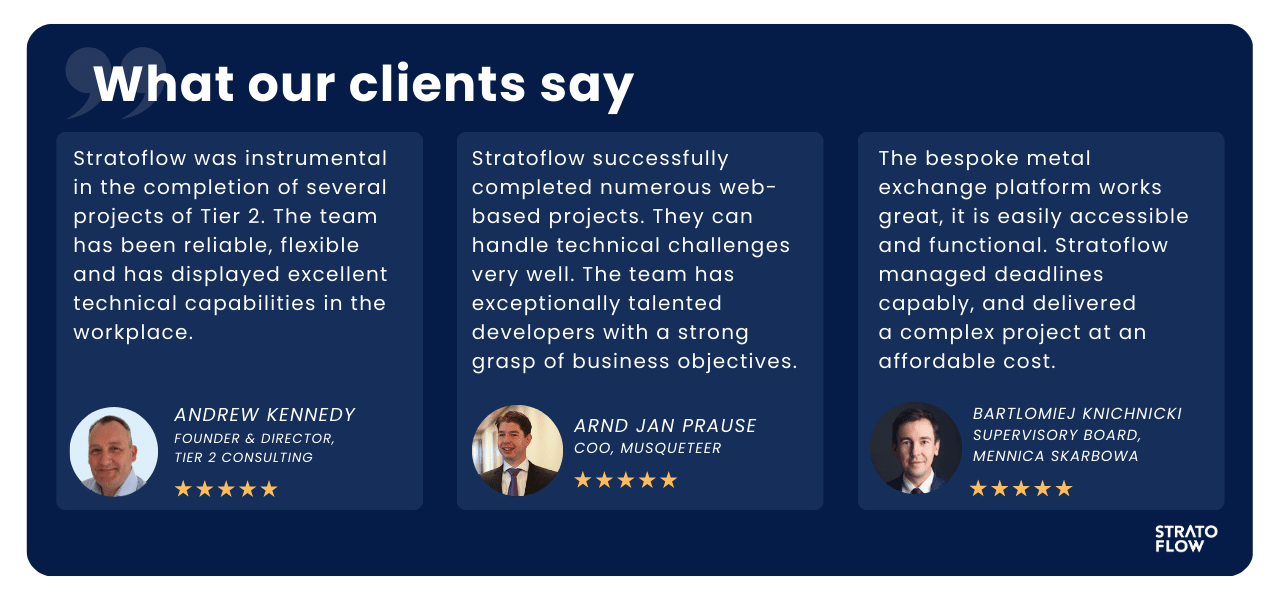
By thoroughly vetting potential IT service providers on Clutch against these criteria, organizations can make informed decisions and select a trusted partner that maximizes the benefits of outsourcing while minimizing the risks and ensuring a partnership that drives digital transformation.
If you look for more insights and tips for searching for reputable development companies and outsourcing partners be sure to check out the How to Find App Developers Near Me guide on our blog!
Stratoflow – Your Go-To IT Outsourcing Company
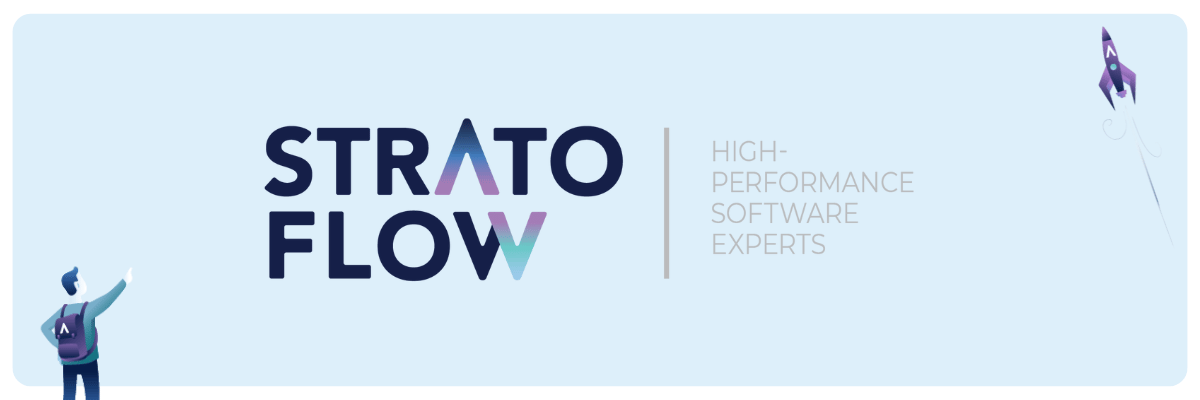
As a leading IT outsourcing provider, Stratoflow offers an unparalleled partnership for companies looking to enhance their technology capabilities.
With a solid track record of successful projects, we specialize in delivering customized software solutions and comprehensive IT services that perfectly align with our clients’ objectives.
Our expertise spans a wide range of industries, including finance, travel, e-commerce and insurance enabling us to offer a diverse and adaptable approach tailored to each specific sector.
We take a meticulous and customer-centric approach to custom software development within our IT outsourcing projects.
Our methodology is designed to ensure that each project is not only aligned with our client’s vision but also strategically positioned for long-term success and scalability, serving as a reliable partner through the entire development process.
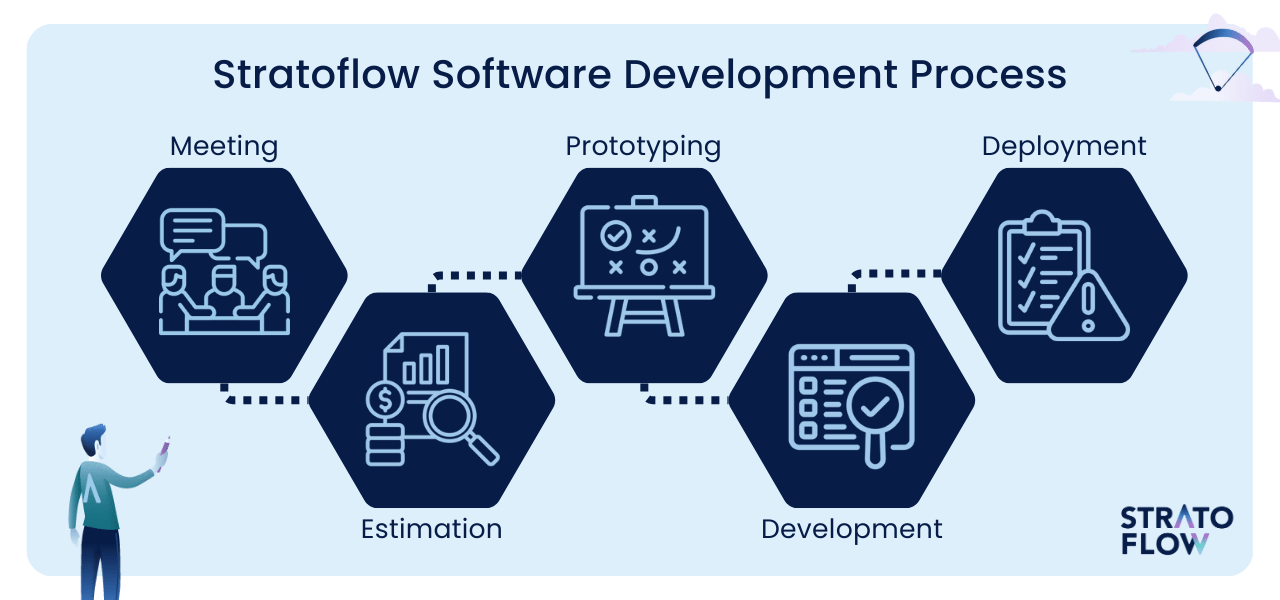
At Stratoflow, our custom software development process begins with a detailed requirements analysis and moves into an agile development phase that includes both design and rigorous quality assurance.
This comprehensive, multi-step approach ensures business process adaptability and precision throughout the project lifecycle.
By leveraging cutting-edge technologies and software development methodologies, we ensure that our solutions are scalable, secure, and efficient, delivering significant improvements in performance and competitive advantage.
Don’t hesitate to contact us to discuss your project that requires professional IT outsourcing services!
Financing Models of IT Outsourcing Projects
IT outsourcing offers a variety of financial engagement models that allow organizations to effectively align their project needs with their budget constraints.
These models address different project scopes, volatility of requirements, and preferred levels of control, providing flexibility in how companies fund and manage their IT needs.
Here’s an overview of the major financial models used in IT and custom software development outsourcing:
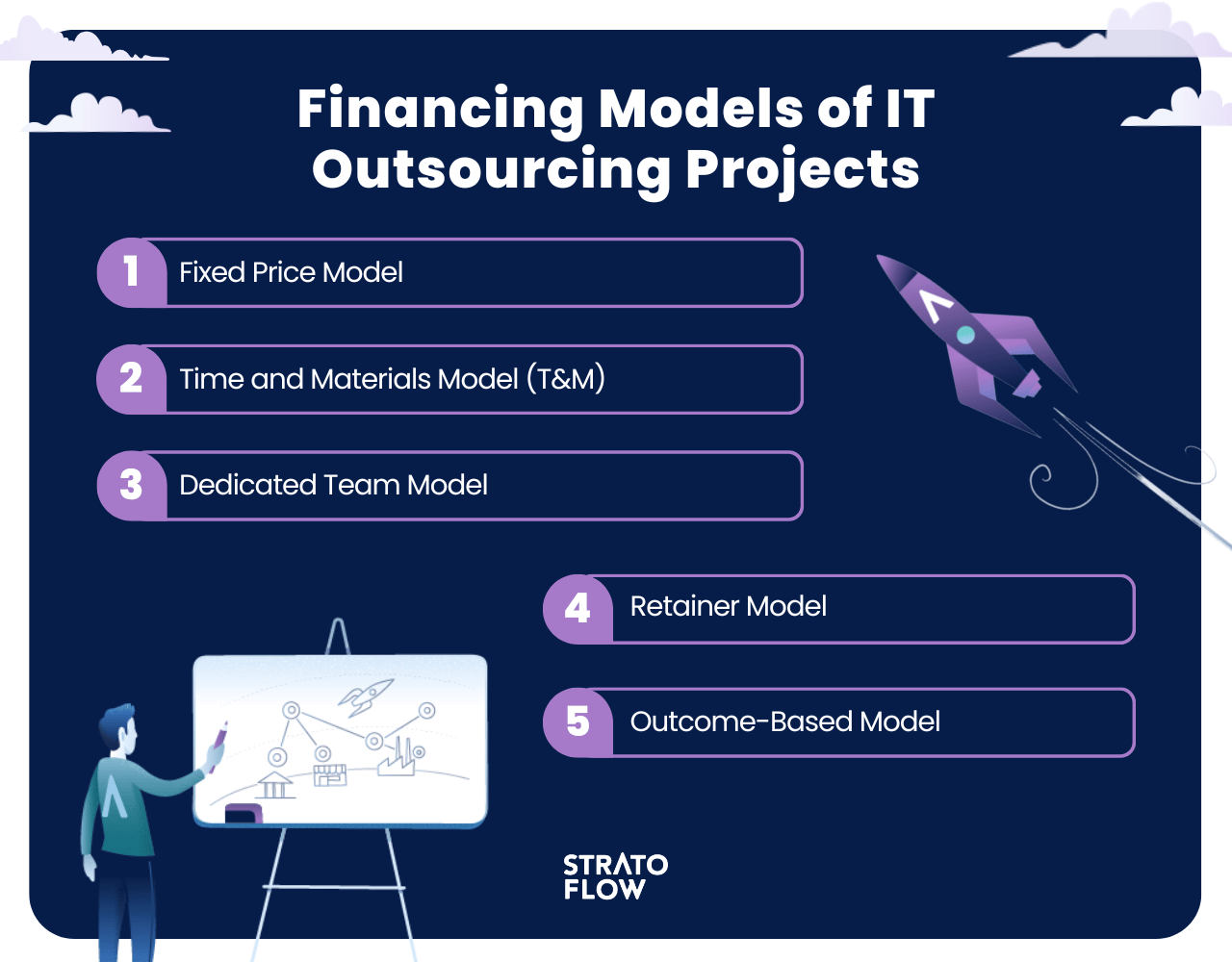
Fixed Price Model
Best suited for projects with well-defined requirements and scopes, the fixed price model sets a specific price for the entire project at the outset.
This model guarantees budget certainty and minimizes risk for the client, as the outsourcing provider assumes responsibility for completing the project within the agreed terms. However, it offers little flexibility for scope modification once the project is underway.
Time and Materials Model (T&M)
Ideal for projects where the scope is not clearly defined or is expected to evolve, the T&M model charges based on the actual time spent by the outsourcing team and the materials used.
This model provides flexibility to adjust requirements, adapt to changing needs, and evolve project objectives over time, with the client retaining control over the development process and associated costs.
Dedicated Team Model
This model involves hiring a team from the outsourcing provider that works full-time on the client’s project, offering a high degree of control and team integration.
client pays a regular fee based on team size which covers salaries, benefits, and overhead costs. This model is effective for long-term projects requiring ongoing work and where the client desires close collaboration with the outsourced team.
Retainer Model
A retainer model is typically used for engaging an outsourcing provider on an ongoing basis for iterative development and maintenance. Clients pay a set fee periodically (e.g., monthly) for a predefined package of services. This ensures the provider’s availability and priority service over the duration of the engagement.
Outcome-Based Model
Growing in popularity, this model ties the payment to the achievement of specific results or milestones.
It aligns the outsourcing provider’s incentives with business outcomes, making it a compelling choice for projects aimed at driving business growth or transformation.
[Read also: How To Hire Angular Developers: 2024 Guide]
What are the Average Costs of IT Outsourcing?
Estimating the cost of software development heavily on the type and size of the project, as well as the financial engagement model chosen.
For smaller projects with well-defined parameters, such as the development of a specific application or software feature, companies may choose a fixed-price model. Costs in this model are predetermined and can range from a few thousand to several tens of thousands of dollars, providing budget certainty but requiring clear initial requirements.
This cost can be brought down by hiring software developers from Poland or other countries with attractive rates.
Medium to large projects, especially those with evolving scope such as the creation of complex, multi-platform systems, are typically aligned with a time-and-materials model.
In this scenario, costs are more variable, but can be estimated based on the hourly rates of outsourced professionals, which can range from $50 to $150 per hour depending on geographic location and level of expertise.
For ongoing or long-term collaborations, such as ongoing development, support and maintenance, the Dedicated Team model is often used.
Here, costs would include monthly payments for each team member, which could range from $10,000 to $25,000 per month, reflecting a composite of salaries, benefits, and operational overhead.
Lowering the Costs of IT Outsourcing
IT outsourcing is immensely beneficial to companies from various industries, but at the same time, as we’ve just seen, it’s an expensive venture.
Is there a way to remedy this?
There is, in the form of rapid development platforms like Openkoda.
Openkoda, an open source platform, leverages AI to provide pre-built application templates and customizable solutions that streamline the development process and improve business operational efficiency by up to 60%.

The key benefits of Openkoda are its rapid development capabilities, flexibility and cost effectiveness.
Users can quickly build a minimum viable product (MVP) and scale their operations without heavy investment in additional resources or long development timelines.
Openkoda excels in multiple domains, including SaaS applications, enterprise systems, and private cloud solutions.
Its framework supports a wide range of applications from time tracking software to insurance policy management, each of which can be customized to meet specific business needs.
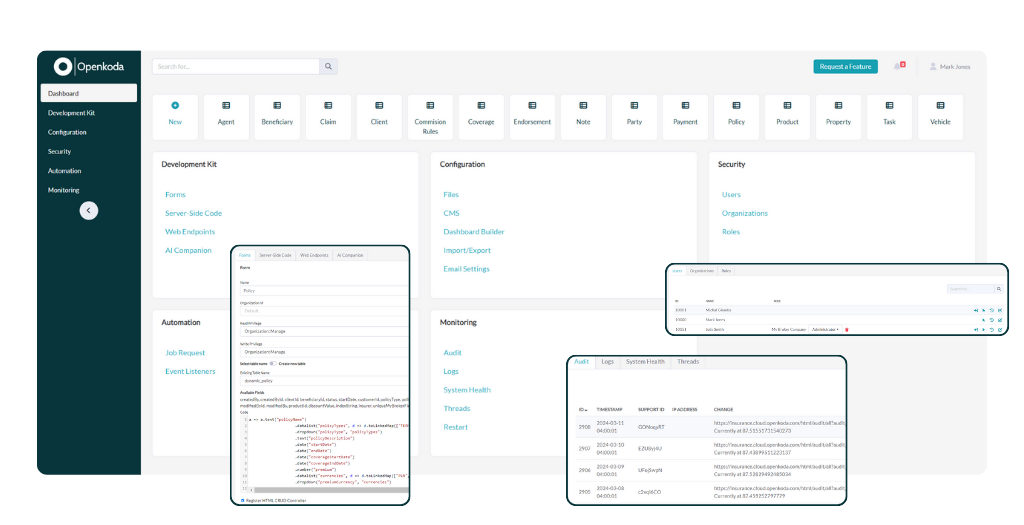
Openkoda provides a platform where code can be reused and easily modified, reducing both initial development time and ongoing maintenance costs.
This ability to modify and extend the platform’s functionality as needed, without having to start from scratch each time, provides organizations with not only a cost-effective solution, but also a highly adaptable one.
Do you want Openkoda’s capabilities in action?
Benefits of working with outsourcing software development companies
Still not convinced?
IT outsourcing and software development outsourcing offer numerous benefits that can help companies scale, innovate and maintain competitive advantage efficiently.
Here are some of the key benefits:
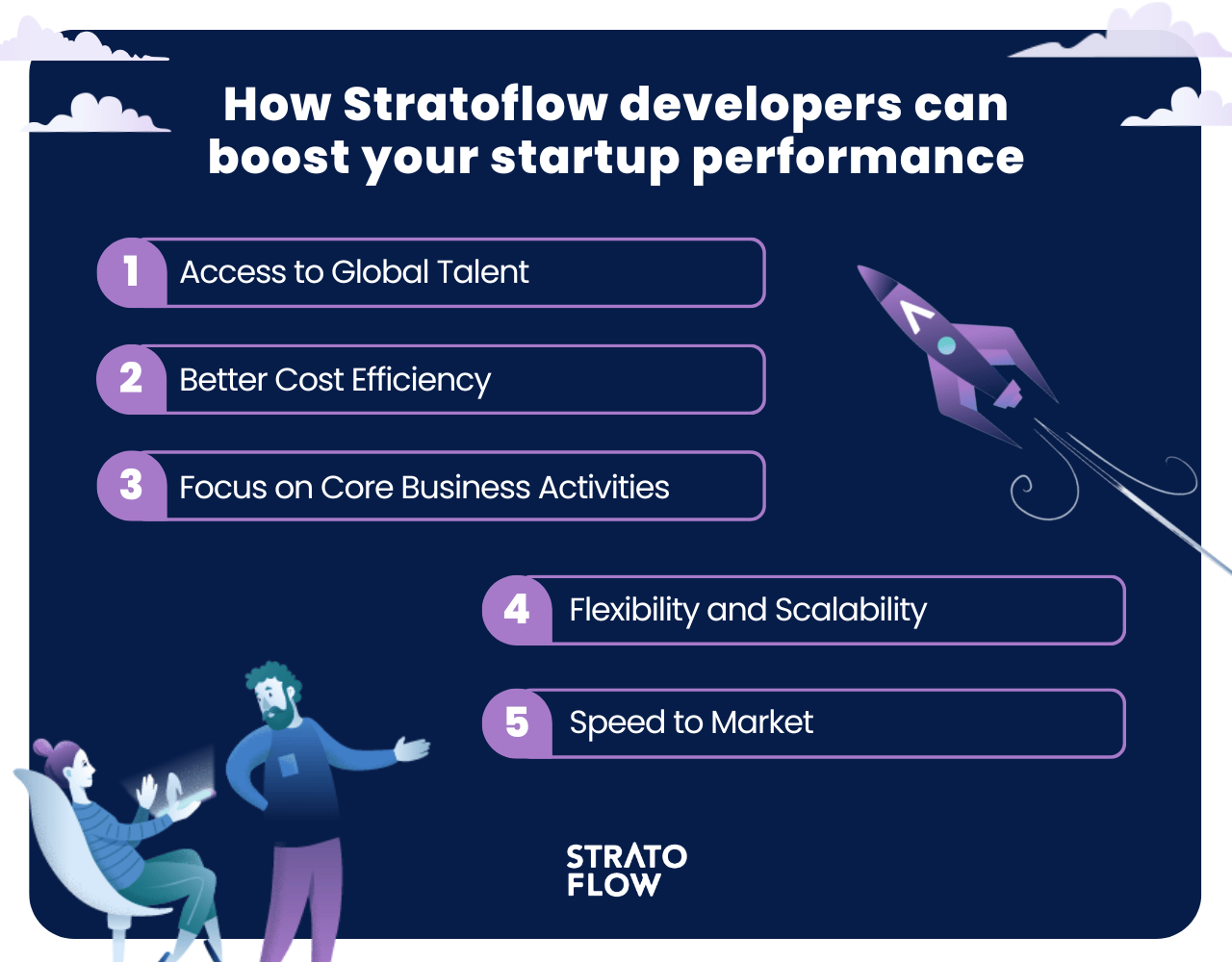
Cost Reduction
Outsourcing often reduces costs associated with hiring, training, and maintaining an in-house development team.
Companies can save on salaries, benefits, workspace, and technology, reallocating resources to other critical business operations.
Access to Expert Talent
Outsourcing provides access to a global talent pool, enabling companies to work with experts who possess niche skills and advanced knowledge in specific technologies or industries.
This is particularly beneficial for projects requiring specialized expertise that is not available locally.
Increased Focus on Core Business Functions
By delegating software development to external partners, businesses can concentrate their internal resources on core activities that drive their competitive advantage and core value proposition, rather than spreading efforts thinly across too many disciplines.
Scalability
Software development outsourcing allows companies to quickly scale their development activities up or down based on business requirements, without the need to hire or lay off staff.
This flexibility helps in managing project timelines and budget more effectively.
Faster Time to Market
With dedicated software developers that expedite development processes and leverage agile methodologies, outsourcing can significantly reduce the time to market for new software products and updates.
This is crucial in today’s fast-paced market environments where speed can be a major differentiator.
IT Outsourcing Statistics
To sum it all up here are a couple of key statistics regarding the IT outsourcing market and its role in today’s economy to once again underscore its value to companies of all sorts:
- Revenue in the IT Outsourcing market is projected to reach US$512.50 billion in 2024.
- According to Statista, the IT Outsourcing market worldwide is projected to grow by 10.99% from 2024 to 2028, resulting in a market volume of US$777.70 billion in 2028.
- According to Zippia, 66% of businesses in the United States outsource at least one department.
- 59% of businesses cite cost as the biggest reason for outsourcing.
FAQ
What are IT outsourcing services?
IT outsourcing services refer to the practice of hiring outside organizations to manage various IT functions that could otherwise be performed in-house.
This approach is used by companies seeking to improve operational efficiency, access advanced technological expertise and reduce costs.
Commonly outsourced services include software development, where companies benefit from specialized skills in building custom applications; cybersecurity, to protect against and respond to cyber threats with advanced countermeasures; and cloud services, where server and storage solutions are managed remotely.
In addition, technical support and network management are often outsourced to ensure reliable and continuous system operations.
IT outsourcing not only helps streamline business processes, but also allows organizations to focus on core strategic activities while leaving technical and highly specialized tasks to expert providers.
As a result, companies can leverage global talent, more quickly adopt innovative technologies, and flexibly adapt to changing market conditions to maintain a competitive edge in their respective industries.
What are the different types of IT Outsourcing?
IT outsourcing can be differentiated into several types based on the location of the service provider relative to the client.
These geographical distinctions help businesses tailor their outsourcing strategies to balance costs, communication needs, and collaboration effectiveness.
Offshore Outsourcing
Offshore outsourcing refers to delegating IT services to companies in distant countries, often on different continents.
This model is primarily chosen for its significant cost savings, thanks to lower labor costs in regions like Asia and Eastern Europe.
While it offers access to a vast pool of talent and round-the-clock productivity, the challenges include cultural differences, language barriers, and potential complications in coordination due to time zone differences.
Nearshore Outsourcing
Nearshore software development outsourcing involves contracting IT services to providers in countries that are geographically closer to the client’s location, typically within the same continent.
This proximity allows for better alignment in time zones and cultural affinities, facilitating easier communication and travel.
Nearshore outsourcing strikes a balance between cost efficiency and convenient collaboration, making it suitable for projects that require more frequent interaction and oversight.
Onshore Outsourcing
Onshore outsourcing, also known as domestic outsourcing, occurs when a company hires service providers within the same country.
This type eliminates cultural and language barriers entirely and provides the greatest ease of coordination and legal compliance.
Although it is often the most expensive option compared to offshore or nearshore, onshore outsourcing is preferred for projects requiring high levels of security, compliance, or critical business interactions that necessitate close proximity.
[Read also: Outsourcing vs. Insourcing: An In-Depth Comparison to Guide Your Business Strategy]
How to choose the best IT outsourcing company?
Choosing the best IT outsourcing software development company is a critical decision that involves several key considerations to ensure alignment with your business objectives and requirements.
First, define the scope and goals of your project to understand the specific expertise and capabilities required. Research potential providers, focusing on those with a strong industry reputation and a track record of handling projects similar in size and complexity to yours.
Reviews and testimonials on platforms such as Clutch can provide valuable insight into a company’s reliability and quality of work.
Evaluate the technical and communication skills of the outsourcing team; it’s critical that they understand your needs and can clearly articulate their processes.
Consider geographic location and outsourcing model (offshore, nearshore, onshore) to balance cost, communication needs and collaboration effectiveness.
In addition, evaluate their compliance with relevant security standards and their ability to protect data, which is especially important in industries with strict data protection regulations.
Related Posts
Thank you for taking the time to read our blog post!
